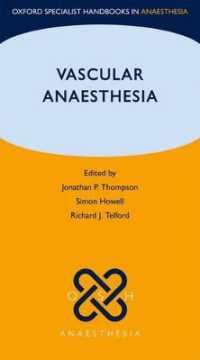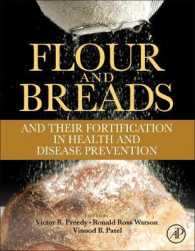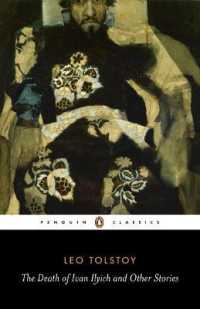- ホーム
- > 洋書
- > 英文書
- > Literary Criticism
Full Description
Russomania: Russian Culture and the Creation of British Modernism provides a new account of modernist literature's emergence in Britain. British writers played a central role in the dissemination of Russian literature and culture during the early twentieth century, and their writing was transformed by the encounter. This study restores the thick history of that moment, by analyzing networks of dissemination and reception to recover the role of neglected as well as canonical figures, and institutions as well as individuals.
The dominant account of British modernism privileges a Francophile genealogy, but the turn-of-the century debate about the future of British writing was a triangular debate, a debate not only between French and English models, but between French, English, and Russian models. Francophile modernists associated Russian literature, especially the Tolstoyan novel, with an uncritical immersion in 'life' at the expense of a mastery of style, and while individual works might be admired, Russian literature as a whole was represented as a dangerous model for British writing. This supposed danger was closely bound up with the politics of the period, and this book investigates how Russian culture was deployed in the close relationships between writers, editors, and politicians who made up the early twentieth-century intellectual class--the British intelligentsia. Russomania argues that the most significant impact of Russian culture is not to be found in stylistic borrowings between canonical authors, but in the shaping of the major intellectual questions of the period: the relation between language and action, writer and audience, and the work of art and lived experience. The resulting account brings an occluded genealogy of early modernism to the fore, with a different arrangement of protagonists, different critical values, and stronger lines of connection to the realist experiments of the Victorian past, and the anti-formalism and revived romanticism of the 1930s and 1940s future.
Contents
Introduction
1: Modern Worlds, Simple Lives
Interchapter 1: The Whitechapel Group
2: Aspects of the Novel: The English Review, the Anglo-Russian Convention, and Impressionism
Interchapter 2: 'The New Spirit' in Theatre
3: War Work: Propaganda, Translation, Civilization
Interchapter 3: Modern Languages
4: Against the Machine: Imagists, Symbolists, Journalists, Diplomats, and Spies
Conclusion: A Different Modern








